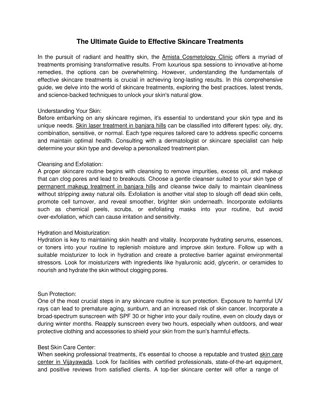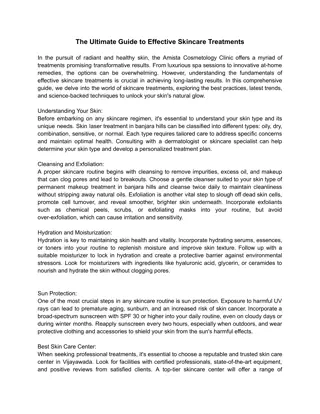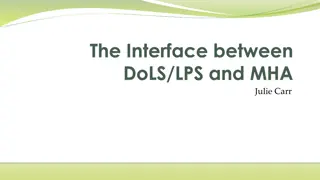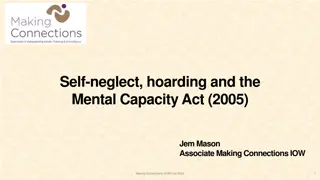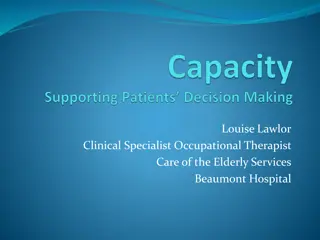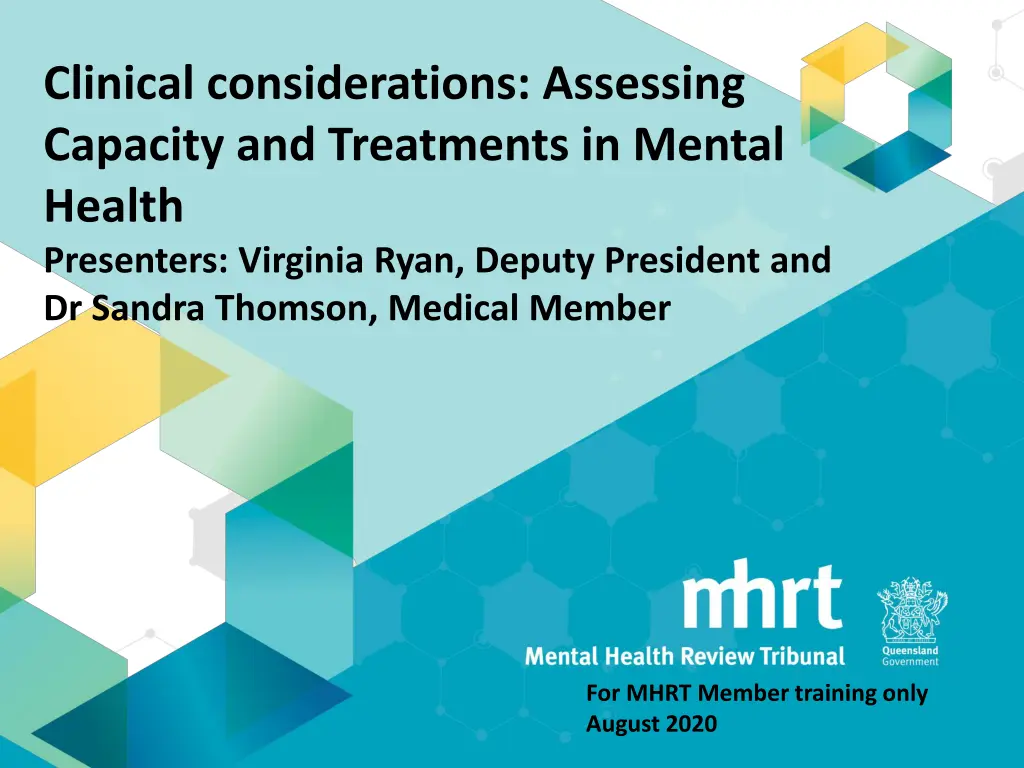
Assessing Capacity and Treatments in Mental Health Training
Explore the clinical considerations, assessment of capacity, and treatments in mental health through the lenses of the MHA2016. Learn about principles, definitions, and objectives related to mental health care and treatment. This training session covers important aspects such as consent to treatment, clinical and tribunal considerations, and the biopsychosocial model.
Download Presentation

Please find below an Image/Link to download the presentation.
The content on the website is provided AS IS for your information and personal use only. It may not be sold, licensed, or shared on other websites without obtaining consent from the author. If you encounter any issues during the download, it is possible that the publisher has removed the file from their server.
You are allowed to download the files provided on this website for personal or commercial use, subject to the condition that they are used lawfully. All files are the property of their respective owners.
The content on the website is provided AS IS for your information and personal use only. It may not be sold, licensed, or shared on other websites without obtaining consent from the author.
E N D
Presentation Transcript
Clinical considerations: Assessing Capacity and Treatments in Mental Health Presenters: Virginia Ryan, Deputy President and Dr Sandra Thomson, Medical Member For MHRT Member training only August 2020
Introduction Capacity Capacity in general Definition in the MHA2016 Assessing capacity to consent to treatment for mental illness Clinical considerations Tribunal considerations Treatments The Biopsychosocial model Medication considerations including depot Where to find more information on treatments
Main objects of the MHA2016 s3 (1) The main objects of this Act are: (a) to improve and maintain the health and wellbeing of persons who have a mental illness who do not have the capacity to consent to be treated; and (b) to enable persons to be diverted from the criminal justice system if found to have been of unsound mind at the time of committing an unlawful act or to be unfit for trial; and (c) to protect the community if persons diverted from the criminal justice system may be at risk of harming others.
Principles in the MHA2016 s5 The following principles apply to the administration of this Act in relation to a person who has, or may have, a mental illness: (b) Matters to be considered in making decisions a person is presumed to have capacity to make decisions about the person s treatment and care and other matters under this Act.
MHA2016 Definition of capacity Section 14 Meaning of capacity to consent to be treated (1) A person has capacity to consent to be treated if the person: (a) is capable of understanding, in general terms: (i) that the person has an illness, or symptoms of an illness, that affects the person s mental health and wellbeing; and (ii) the nature and purpose of the treatment for the illness; and (iii) the benefits and risks of the treatment, and alternatives for the treatment; and (iv) the consequences of not receiving the treatment; and (b) is capable of making a decision about the treatment and communicating the decision in some way.
MHA2016 Definition of capacity cont. (2) A person may have capacity to consent to be treated even through the person decides not to receive treatment. (3) A person may be supported by another person in understanding the matters mentioned in subsection (1)(a) and making a decision about the treatment. (4) This section does not affect the common law in relation to: (a) the capacity of a minor to consent to be treated; or (b) a parent of a minor consenting to treatment of the minor.
What does capacity mean? When a person has capacity to make a particular decision, they are able to do all of the following: understand the facts involved understand the main choices weigh up the consequences of the choices understand how the consequences affect them communicate their decision. NSW capacity toolkit
Different factors influencing capacity DOMAIN specific finances vs health care DECISION specific major surgery vs flu vaccination medication vs ECT TIME specific fluctuating capacity Balance between the principles of: autonomy (being able to make ones own decisions) beneficence (responsibility to protect vulnerable people from their choices) A seemingly unwise decision may trigger capacity questions, but the decision on its own, should not determine one lacks capacity.
The need to assess capacity If a person lacks capacity to make decisions about their own mental health care, alternative mechanisms need to be considered, including: Advance Health Directive (AHD) Guardianship Statutory Health Attorney for mental health treatment involuntary treatment using the MHA2016. Capacity is a key concept for a number of Tribunal matters: Treatment criteria for Treatment Authorities Approvals of regulated treatment (ECT and NANP) Fitness for Trial matters.
Assessing capacity Approach is a functional one. Based on the ability of the person to be provided information surrounding the decision at hand, then assessing how the person uses that information e.g. to weigh up the various factors relevant to the decision and then communicating this decision. Cognitive abilities required to understand the decision: processes of attention, comprehension, memory, reasoning and problem solving. Diagnosis of a condition, e.g. dementia, is not sufficient to determine decision-making ability. Threshold test being higher for matters of greater risk or complexity.
Chief Psychiatrist policy See: Treatment criteria, assessment of capacity, less restrictive way and advance health directives policy Clinicians should work collaboratively with and in partnership with patients to ensure their unique age-related, cultural and spiritual, gender-related, religious and communication needs are recognised, respected and followed to the greatest extent practicable. Clinicians should consider the timely involvement of appropriate local supports and provide treatment and care with a recovery-oriented focus. Support must be provided to assist the person in making decisions about their treatment, as far as practicable. This includes providing the person and their support person/s with all relevant information (e.g. clinical formulation, nature of treatment proposed, options for less restrictive forms of treatment, etc.). Information must be provided in a format that best assists the person to understand including the use of interpreters, visual aids, simple language, etc.
Chief Psychiatrist policy cont. A person must be provided the opportunity to provide consent at a time, and in a place, that best supports the person s decision-making. Cross-sectional assessments may not accurately reflect a person s capacity beyond that point in time. Accordingly, capacity assessments must be conducted across a number of examinations to facilitate stability in the clinical opinion. Clinicians must be aware that not consenting to treatment does not necessarily imply a lack of capacity. A person may have capacity to make a decision about treatment but still not consent to it.
Disorders that may affect capacity Cognitive disorders Mood disorders Psychotic disorders
Cognitive disorders Dementia Delirium which can persist and fluctuate over time Organic brain syndromes e.g. frontal lobe syndrome, amnestic disorders (alcohol) Significant intellectual disability Language disorders: e.g. post stroke conditions leading to varying degrees of dysphasia difficulties both with understanding and expressing language e.g. person displays inconsistent yes/no responses.
Mood disorders Depression especially if severe with suicidality, psychomotor slowing or agitation, ruminations and/or psychotic features. Delusional guilt may underpin agreeing to ECT wanting to be punished. Cognitive abilities can be impacted attention and concentration, memory, processing speed and executive/problem solving functioning. Mania impacts via distractibility, talkativeness, flight of ideas, rapid speech, grandiose thinking may override usual pattern of decision making impacting judgment. Anxiety when severe or comorbid with other illness, can impact on ability to persevere with a decision over short periods of time, through indecisiveness, ruminating, catastrophizing.
Psychotic disorders Schizophrenia, delusional disorder, schizoaffective disorder, mood disorders with psychosis, organic brain syndromes Various presentations may impact differently impaired reality interpretation or misunderstanding due to disorganised thinking, delusional content, disturbed perception via hallucinations. Content of delusions can impact directly upon the understanding of the decisions to be made around treatment e.g. delusion that ECT will change person into a cyborg. Delusions may not be present if on medication, such that informed consent may be possible.
Insight Clinical concept of insight: multiple components around acceptance of illness, recognition and also response need to explore insightlessness . While a lack of insight may suggest a lack of decision- making capacity, it will rarely be determinative.
Conducting a capacity assessment Clinicians aim for a comprehensive mental state assessment including information gathered across a number of areas presenting problem, current functioning, background medical and psychiatric history, forensic and legal history and substance use history as well as relevant cultural factors. A mental state examination (MSE) and risk assessment will be performed and appropriate collateral information sought to achieve a formulation of the presenting problem, and if there is a mental illness, what treatment. At that stage, the assessment of the person s capacity to consent to being treated for that illness is made.
Capacity examination Examination will include a comment on: level of awareness or wakefulness attention and concentration memory including orientation short term recall (e.g. 3 object recall) recall of recent and remote personal events recall of general knowledge information. Common tools: MMSE/30-Mini Mental State Examination ACE/100-Addenbrooke s Cognitive Examination MSQ/10-Mental Status Questionnaire.
Questions the Tribunal could ask What problem are you having right now? Why are you in hospital? What is the treatment for your problem? Are there any good things about the treatment? Are there any bad how do you deal with those? Are there any other treatments? What other options do you have? How could treatment help you? What could happen if you don t have treatment?
Treatments - Introduction Mental illness is common in the community. MHRT is seeing a particular population skewed to public hospital population, more seriously ill, forensic population. MHRT process may focus on medication treatments due to nature of population, but there is much more available.
Biopsychosocial & Lifestyle Model Source: https://www.ranzcp.org/File s/Resources/Publications/C PG/Clinician/Mood- Disorders-CPG.asp
Example: Management of Major Depressive Disorder Step 0: Cease agents potentially lowering mood, Institute sleep hygiene, Implement appropriate lifestyle changes Step 1 (if Step 0 insufficient): Psychosocial interventions: psychoeducation, format support groups, employment/housing assistance Psychological therapy: e.g. CBT Pharmacotherapy: First line: SSRIs, SNRIs, melatonin agonist, serotonin modulator Second line: Tricyclic antidepressants, MAOIs
Example: Management of Major Depressive Disorder cont. Step 2 (if Step 1 insufficient): Combine pharmacotherapy and psychological therapy Increase medication dosage Augment antidepressant medication with lithium and/or antipsychotic medication Combine antidepressants Step 3 (if Step 2 insufficient): ECT
Medication prescribing considerations Multiple considerations for each individual: Appropriateness for particular diagnosis Outcome possibilities Individual preferences Risk/benefit analysis Informed consent issues Financial cost Planned monitoring/review and duration of treatment Physical health: weight, cardiac status, current medications, past treatments.
Depot medications Medication is taken by regular injection rather than orally. Depot sits under the skin and releases medication over two to four weeks to release a steady dose. Guarantee of the provided dose entering system. Type of injection determines how quickly that medication is available to circulate to the brain. Used? if person likely to forget medication if person likely to purposefully non-compliant with medication
Where to find more information on treatments RANZCP provides guidelines and resources: https://www.ranzcp.org/practice-education/guidelines-and- resources-for-practice MHRT Information Sheets (website): Diagnoses Treatments https://www.choiceandmedication.org/queenslandhealth/ Contains medication leaflets for many different medications including clozapine, lithium, lorazepam and sodium valproate. Leaflets contain information in simple terms addressing what medication is used for, usual dosage and side effects. Can also find charts comparing medications used to treat certain conditions.


